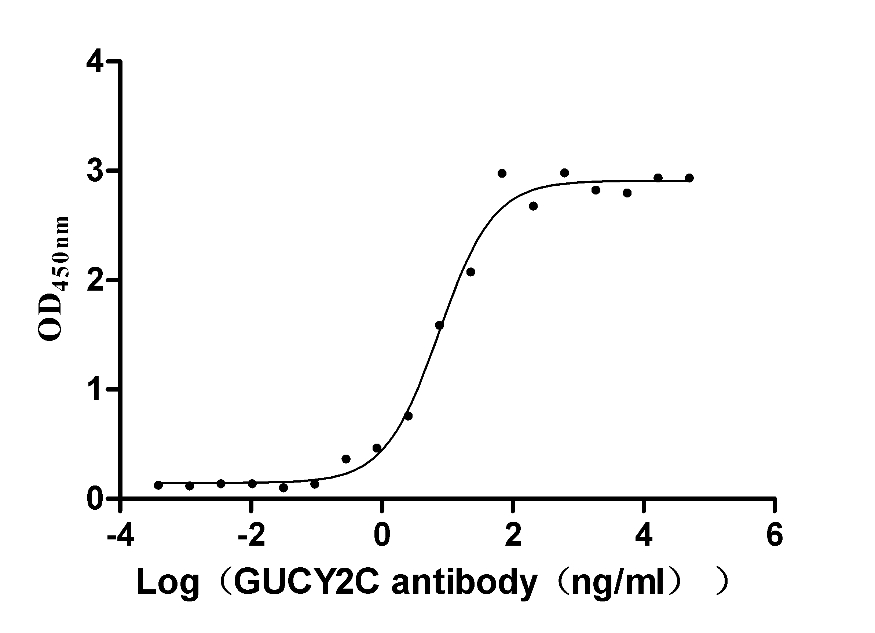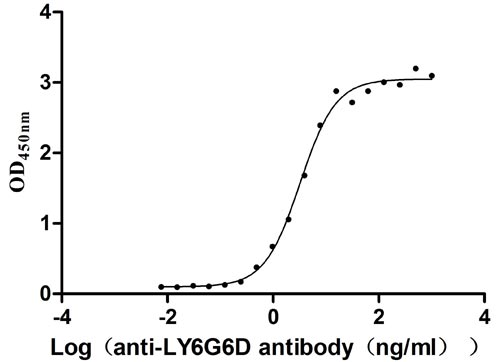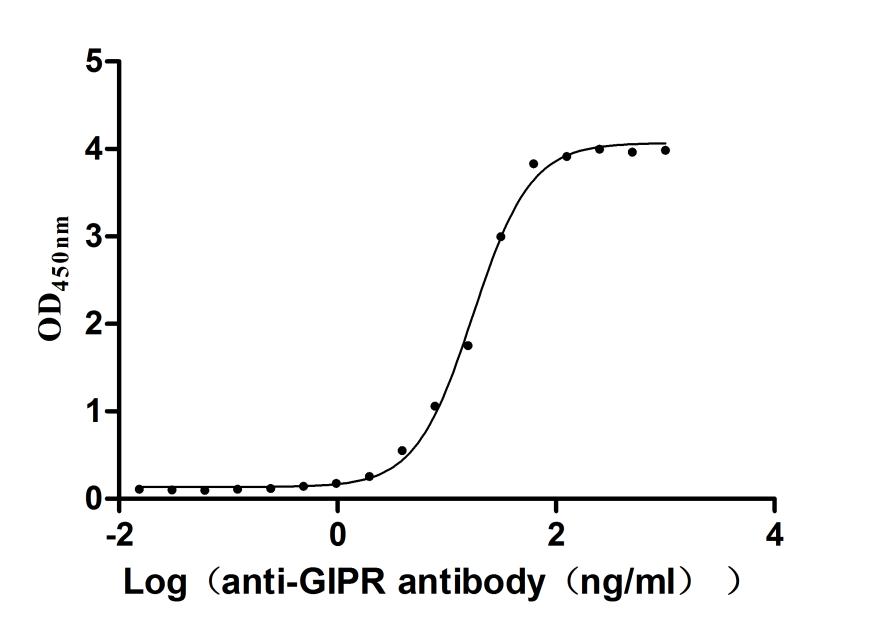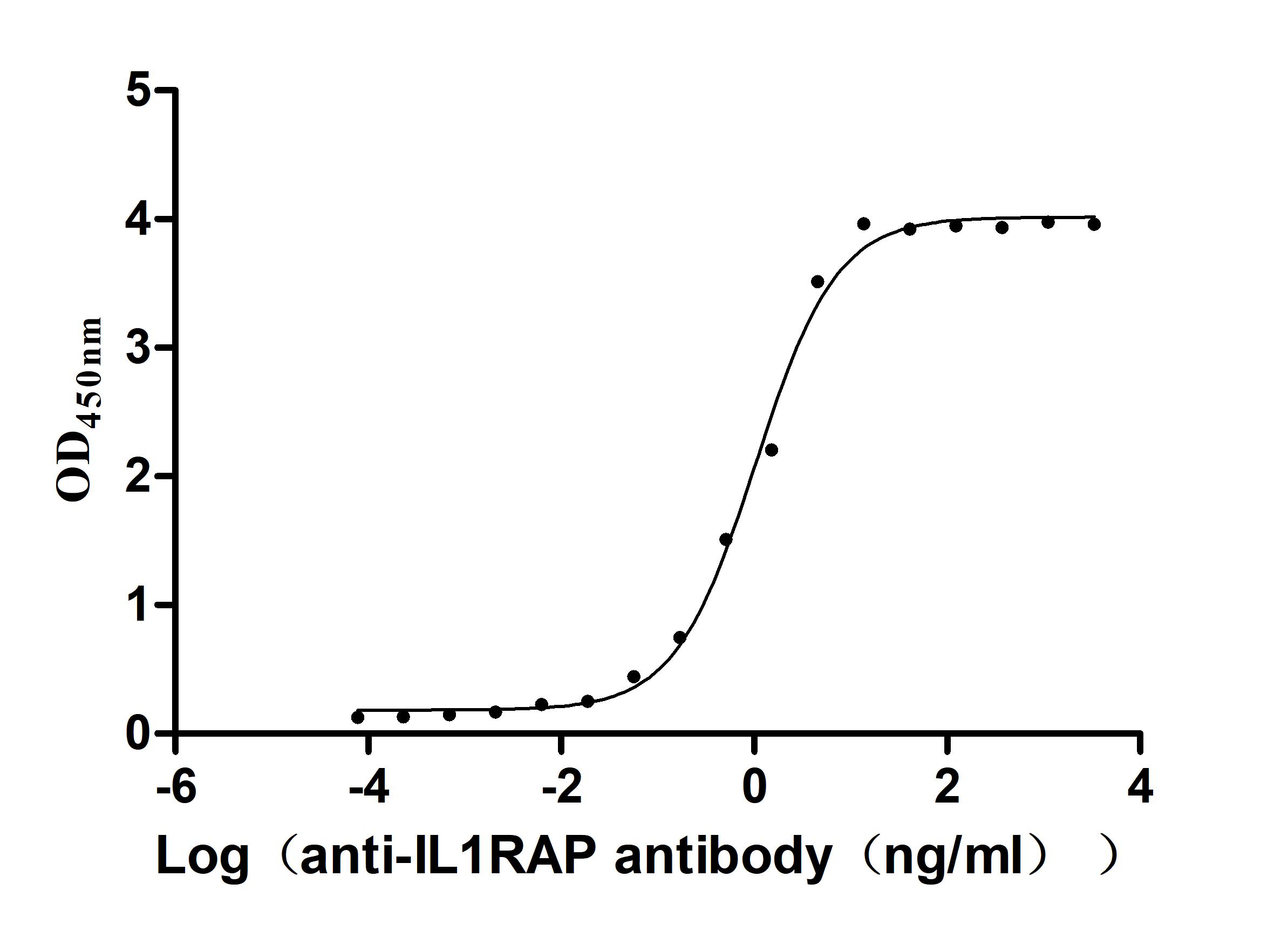Recombinant Human Asparagine synthetase [glutamine-hydrolyzing] (ASNS)
-
货号:CSB-YP002219HU
-
规格:
-
来源:Yeast
-
其他:
-
货号:CSB-EP002219HU
-
规格:
-
来源:E.coli
-
其他:
-
货号:CSB-EP002219HU-B
-
规格:
-
来源:E.coli
-
共轭:Avi-tag Biotinylated
E. coli biotin ligase (BirA) is highly specific in covalently attaching biotin to the 15 amino acid AviTag peptide. This recombinant protein was biotinylated in vivo by AviTag-BirA technology, which method is BriA catalyzes amide linkage between the biotin and the specific lysine of the AviTag.
-
其他:
-
货号:CSB-BP002219HU
-
规格:
-
来源:Baculovirus
-
其他:
-
货号:CSB-MP002219HU
-
规格:
-
来源:Mammalian cell
-
其他:
产品详情
-
纯度:>85% (SDS-PAGE)
-
基因名:ASNS
-
Uniprot No.:
-
别名:asnS; ASNS_HUMAN; ASNSD; Asparagine synthetase [glutamine-hydrolyzing]; Asparagine synthetase; Cell cycle control protein TS11; Glutamine dependent asparagine synthetase 3; Glutamine dependent asparagine synthetase; Glutamine hydrolyzing; Glutamine-dependent asparagine synthetase; OTTHUMP00000024510; OTTHUMP00000204938; OTTHUMP00000204939; OTTHUMP00000204940; OTTHUMP00000204941; OTTHUMP00000204942; TS11 ; TS11 cell cycle control protein
-
种属:Homo sapiens (Human)
-
蛋白长度:Full Length of Mature Protein
-
表达区域:2-561
-
氨基酸序列CGIWALFGS DDCLSVQCLS AMKIAHRGPD AFRFENVNGY TNCCFGFHRL AVVDPLFGMQ PIRVKKYPYL WLCYNGEIYN HKKMQQHFEF EYQTKVDGEI ILHLYDKGGI EQTICMLDGV FAFVLLDTAN KKVFLGRDTY GVRPLFKAMT EDGFLAVCSE AKGLVTLKHS ATPFLKVEPF LPGHYEVLDL KPNGKVASVE MVKYHHCRDV PLHALYDNVE KLFPGFEIET VKNNLRILFN NAVKKRLMTD RRIGCLLSGG LDSSLVAATL LKQLKEAQVQ YPLQTFAIGM EDSPDLLAAR KVADHIGSEH YEVLFNSEEG IQALDEVIFS LETYDITTVR ASVGMYLISK YIRKNTDSVV IFSGEGSDEL TQGYIYFHKA PSPEKAEEES ERLLRELYLF DVLRADRTTA AHGLELRVPF LDHRFSSYYL SLPPEMRIPK NGIEKHLLRE TFEDSNLIPK EILWRPKEAF SDGITSVKNS WFKILQEYVE HQVDDAMMAN AAQKFPFNTP KTKEGYYYRQ VFERHYPGRA DWLSHYWMPK WINATDPSAR TLTHYKSAVK A
-
蛋白标签:Tag type will be determined during the manufacturing process.
The tag type will be determined during production process. If you have specified tag type, please tell us and we will develop the specified tag preferentially. -
产品提供形式:Lyophilized powder
Note: We will preferentially ship the format that we have in stock, however, if you have any special requirement for the format, please remark your requirement when placing the order, we will prepare according to your demand. -
复溶:We recommend that this vial be briefly centrifuged prior to opening to bring the contents to the bottom. Please reconstitute protein in deionized sterile water to a concentration of 0.1-1.0 mg/mL.We recommend to add 5-50% of glycerol (final concentration) and aliquot for long-term storage at -20℃/-80℃. Our default final concentration of glycerol is 50%. Customers could use it as reference.
-
储存条件:Store at -20°C/-80°C upon receipt, aliquoting is necessary for mutiple use. Avoid repeated freeze-thaw cycles.
-
保质期:The shelf life is related to many factors, storage state, buffer ingredients, storage temperature and the stability of the protein itself.
Generally, the shelf life of liquid form is 6 months at -20°C/-80°C. The shelf life of lyophilized form is 12 months at -20°C/-80°C. -
货期:Delivery time may differ from different purchasing way or location, please kindly consult your local distributors for specific delivery time.Note: All of our proteins are default shipped with normal blue ice packs, if you request to ship with dry ice, please communicate with us in advance and extra fees will be charged.
-
注意事项:Repeated freezing and thawing is not recommended. Store working aliquots at 4°C for up to one week.
-
Datasheet :Please contact us to get it.
相关产品
靶点详情
-
基因功能参考文献:
- basal ASNS expression at protein levels was significantly correlated with sensitivity to combined treatment. These results provide mechanistic insights into the role of GCN2 in the amino acid response and a rationale for further investigation of GCN2 inhibitors for the treatment of cancer. PMID: 30061420
- The expression of ASNS was significantly elevated when ATF6 was over expressed. The expressions of these 2 genes were both decreased in hepatocellular carcinoma (HCC)patients, and it was more significantly with ASNS. The mRNA levels of ASNS and ATF6 were positively correlated with each other. rs34050735 was associated with HCC in the case-control study and also an independent predictor of overall survival of HCC patients. PMID: 28629319
- our study demonstrated that ASNS had an important role in the growth of human lung cancer cells by inhibiting the proliferation and arresting cell cycle of lung cancer cells PMID: 27444726
- review of ASNS function, structure, mutations and roles in genetic disease and asparaginase drug resistance PMID: 29084849
- Transient knockdown of ASNS inhibited cell proliferation and colony formation in AGS and MKN-45 cells. Stable knockdown of ASNS conferred sensitivity to cisplatin in these cells. Depletion of ASNS and cisplatin treatment exerted synergistic effects on tumor growth in AGS xenografts. Moreover, ASNS was found to be up-regulated in human gastric cancer tissues compared with matched normal colon tissues. PMID: 27251594
- role of ASNS in melanoma cells A375 and human epidermoid carcinoma cell line A431 PMID: 25858017
- Polymorphisms of ASNS are associated with an increased risk of asparaginase-related complications in children with acute lymphoblastic leukemia. PMID: 24907114
- Data shows that high ASNS expression in NK/T cell lymphoma is correlated with worse clinicopathological features. PMID: 24913732
- ASNS deficiency is correlated with poor therapeutic response and worse survivals in patients with rectal cancer receiving neoadjuvant CCRT PMID: 24729124
- cell differentiation was enhanced when asparagine in the culture media was depleted by an addition of L-asparaginase, indicating that downregulation of asparagine synthetase gene expression PMID: 24398846
- ASNS and MMP19, along with eIF3a, are the sensitivity factors for cisplatin treatment and may serve as potential candidate molecular markers for predicting cisplatin sensitivity of advanced nasopharyngeal carcinoma. PMID: 23956056
- A conditional interaction between the ASNS polymorphism and an early response to chemotherapy among pediatric patients with acute lymphoblastic leukemia. PMID: 24268318
- study indicates that asparagine synthesis is essential for the development and function of the brain. PMID: 24139043
- expression of ASNS was higher in hepatocellular carcinoma tissues; expression of ASNS is an independent factor affecting the survival of HCC patients, and low ASNS expression in HCC was correlated with worse surgical outcomes PMID: 23764751
- Identifying the roles of ASNS in fetal development, tissue differentiation, and tumor growth may reveal that ASNS function extends beyond asparagine biosynthesis. PMID: 23403946
- Subcellular translocation of asparagine synthetase may play an important role in L-asparaginase resistance in leukemia cells. PMID: 21505976
- Activation of asparagine synthetase by amino acid limitation results in dynamic changes in genomic histone association. PMID: 22978410
- AsnS mRNA expression level in tumor cells reflects the sensitivity of cells to L-asparaginase. PMID: 20561401
- High expression of asparagine synthetase is associated with a poor outcome in ALL children. PMID: 19035175
- Role of Sp1 and Sp3 in the nutrient-regulated expression of the human asparagine synthetase gene PMID: 11867623
- ATF4 is a mediator of the nutrient-sensing response pathway that activates asparagine synthetase gene PMID: 11960987
- Genomic sequences necessary for transcriptional activation by amino acid deprivation of mammalian cells. activation of asparagine synthetase gene by endoplasmic reticulum stress. PMID: 12097650
- documentation of the comparison between CHOP and AS transcriptional control elements used by the amino acid pathway PMID: 12351626
- ATF3-FL and C/EBPbeta act as transcriptional suppressors for the ASNS gene to counterbalance the transcription rate activated by ATF4 following amino acid deprivation PMID: 15385533
- The Asparagine Synthetase), which is a housekeeping gene, is repressed and the promoting region of the gene is highly methylated. PMID: 15674423
- coorelation between methylation of ASNS and acute lymphoblastic leukemia PMID: 16598302
- results suggest that the presence of MELAS and NARP mtDNA mutations elicits upregulation of CHOP and ASNS genes through the elevation of ATF4 expression and its binding to the amino acid regulatory element and nutrient-sensing response element-1 PMID: 17276738
- RNA interference decreases capacity of mesenchymal stem cells to protect acute lymphoblastic leukemia cells from asparaginase, whereas enforced ASNS expression conferred enhanced protection. PMID: 17380207
- ASNS (asparagine synthetase) transcription activity was up-regulated in HepG2 cells treated with the UPR activators thapsigargin and tunicamycin PMID: 18840095
- These findings provide rationale for evaluation of ASNS protein expression as a predictive biomarker of clinical L-ASP activity in ovarian cancer. PMID: 18852115
- CHOP is a member of the transcription factor network that controls the stress-induced regulation of specific C/EBP-ATF4-containing genes, such as ASNS PMID: 18940792
- DNA polymorphism of a tandem repeated sequence is associated with the asparagine synthetase gene in acute lymphoblastic leukemia PMID: 19054556
- Declined asparagine synthetase mRNA expression and enhanced sensitivity to asparaginase in HL-60 cells committed to monocytic differentiation. PMID: 19414379
- ASNS protein expression predicts L-asparaginase chemotherapeutic activity in a large, diverse set of ovarian cancer cell lines. PMID: 18852115
- ASNS RNAi potentiates L-asparaginase chemotherapeutic activity in ovarian cancer cell lines from the NCI-60, and ASNS mRNA expression predicts L-asparaginase activity in the ovarian subpanel of the NCI-60. PMID: 17088436
显示更多
收起更多
-
相关疾病:Asparagine synthetase deficiency (ASNSD)
-
数据库链接:
HGNC: 753
OMIM: 108370
KEGG: hsa:440
STRING: 9606.ENSP00000175506
UniGene: Hs.489207
Most popular with customers
-
Recombinant Human Heat-stable enterotoxin receptor (GUCY2C), partial (Active)
Express system: Mammalian cell
Species: Homo sapiens (Human)
-
Recombinant Human T-cell surface protein tactile (CD96), partial (Active)
Express system: Mammalian cell
Species: Homo sapiens (Human)
-
Recombinant Human Angiopoietin-2 (ANGPT2) (Active)
Express system: Mammalian cell
Species: Homo sapiens (Human)
-
Recombinant Human Intestinal-type alkaline phosphatase (ALPI) (Active)
Express system: Mammalian cell
Species: Homo sapiens (Human)
-
Recombinant Human Lymphocyte antigen 6 complex locus protein G6d (LY6G6D) (Active)
Express system: Yeast
Species: Homo sapiens (Human)
-
Recombinant Human Gastric inhibitory polypeptide receptor(GIPR),partial (Active)
Express system: Mammalian cell
Species: Homo sapiens (Human)
-
Recombinant Human Tumor necrosis factor ligand superfamily member 15(TNFSF15) (Active)
Express system: Mammalian cell
Species: Homo sapiens (Human)
-
Recombinant Macaca fascicularis Interleukin 1 receptor accessory protein(IL1RAP), partial (Active)
Express system: Mammalian cell
Species: Macaca fascicularis (Crab-eating macaque) (Cynomolgus monkey)



-AC1.jpg)
-AC1.jpg)



-AC1.jpg)











